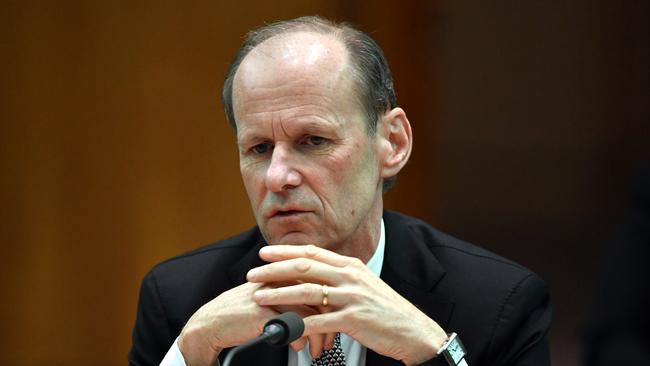No sign of pay cuts for bank CEOs
CEOs at the big four banks are yet to join the ranks of business leaders sharing the financial pain of their staff and customers.

Chief executives at Australia’s four major banks are yet to have their salary packages trimmed, despite the banking regulator urging the finance sector to scrap executive cash bonuses.
As executives at some of Australia’s largest companies take hefty pay cuts in an attempt to reduce costs during the coronavirus shutdown, The Australian understands the banking sector’s leaders will not undertake voluntary discounts to their remuneration packages.
Last week the Australian Prudential Regulatory Authority urged banks and insurance companies to suspend executive cash bonuses and dividend payments as part of a range of capital management measures it was recommending.
A CBA spokesman said the board was considering the guidance issued by APRA surrounding capital management. The other three major banks — ANZ, NAB and Westpac — confirmed changes to remuneration were not being considered.
CBA’s chief executive Matt Comyn has a base salary of $2.2m, while NAB chief executive Ross McEwan takes home a starting salary of $2.5m.
But while Westpac executives will not forgo pay, chief executive Peter King has scrapped all short-term salary incentives in the wake of the scandal surrounding the allegations Austrac made against the bank last year. Mr King’s base salary is $2.4m.
This week ANZ chief executive Shayne Elliott said he had not taken a voluntary haircut on his $2.1m salary, noting salary reductions had generally been in companies where there has been significant deterioration in operations.
Outside the big four banks, Bank of Queensland and Bendigo and Adelaide Bank have yet to indicate whether executive salary cuts are an option. ASX-listed companies including Crown Resorts, Flight Centre, Scentre Group and Qantas have all announced executive pay reductions due to COVID-19.
Westfield owner Scentre Group cut its executive salaries by 20 per cent.
Crown Resorts chief executive Ken Barton on Thursday sacrificed 20 per cent of his pay, after the company stood down more than 11,500 employees; a number representing close to 95 per cent of its entire workforce.
Qantas chief executive Alan Joyce said in March he would not draw a wage for the remainder of the financial year.
Professional services firms have also not been exempt from the downturn.
Accounting firm PwC on April 6 said its Australian workforce of 8000 will drop down to a four-day week from the start of May, with partner incomes being reduced by as much as 40 per cent.
Deloitte and KPMG also cut salaries by a fifth, while Ernst and Young has asked partners to drop working hours by at least 20 per cent.
International legal firm Ashurst told staff it would be moving to an 80 per cent work pattern for the next three months, with an equivalent reduction in remuneration.
Buy now, pay later provider Zip, which is partially backed by Westpac, said on April 8 that its executive team would take a voluntary pay cut of 20 per cent.
Telco providers Telstra and Optus have not indicated whether executive salary reductions are being considered.


